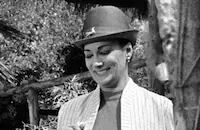Wink of an Eye
Cast & Crew
Winston Jones
Jonathan Kidd
Doris Dowling
Barbara Turner
Irene Seidner
Jaclynne Greene
Film Details
Technical Specs

Synopsis
Mild-mannered chemist Alvin Atterbury chafes under the constant criticism by his boss at a perfume factory. In response to being removed from an important experiment, Atterbury begins spending more time with attractive co-worker Myrna Duchane. At home Atterbury endures constant nagging from his wife, who begins to fear her husband may be planning to run away to Mexico with Myrna. The Atterbury's neighbor, elderly Mrs. Lazlo, grows concerned when she hears the couple arguing, punctuated one night by an unexplained scream. Soon after, Mrs. Lazlo notices that Mrs. Atterbury has disappeared. Unknown to Atterbury, his wife has rented their spare room to a young law student, Judy Carlton, who turns up at the house prepared to move in. When Atterbury initially refuses to allow her inside, a frustrated Judy seeks the help of Sheriff Cantrick and Atterbury reluctantly gives her access to the room. Perplexed by Atterbury's secretive behavior, Judy soon notices the chemist's nightly visits to the cellar, which are followed by strange sounds. Upon seeing Atterbury placing strange packages from the cellar in the freezer, Judy decides to investigate. In the cellar, Judy is horrified to discover what appears to be parts of a body, but before she can report her findings, she hears Atterbury returning with Myrna. Petrified, Judy screams, attracting the attention of Mrs. Lazlo, who summons Cantrick. Under the sheriff's questioning, Atterbury explains that he and Myrna have been working on their own experiment to develop a musk perfume, using the remains of a South American jungle animal, and are planning to sell the formula to a rival Mexican manufacturer. Just after they finish their account, Mrs. Atterbury returns and she and her husband admit that she is an alcoholic and has just spent a few days in a sanitarium for a rest cure. A few days later, Mrs. Lazlo calls, only to learn that Mrs. Atterbury is again out of town. After her departure, Atterbury returns to the cellar where he begins dismembering a mysterious object.

Director
Winston Jones
Cast
Jonathan Kidd

Doris Dowling
Barbara Turner
Irene Seidner
Jaclynne Greene

Wally Brown
Paul Smith

Taylor Holmes
Thomas B. Henry

Lucien Littlefield
Max Rich
Henry Slate
Rodney Bell
Dick Nelson
Jack Grinnage
Sam Levin
Howard Roberts
Crew
Stefan Arnsten
Wilbur Bradley
Fernando Carrere
B. B. David
Chester Davis
Theodore Driscoll
James Edmiston
Frank Fitz-gibbon
Arthur Gerstle
Ernest Gold
Clarence Greene
Don Hall Jr.
Winston Jones
John Kean
Helen Mccaffrey
Bob Mendelsohn
Marjorie Moran
Robert Presnell Jr.
Robert Radnitz
Willard M. Reinick
Max Rich
Clark Ross
John Rougeot
Jack Scholl
Chester Shaeffer
Charles Stallings
Herbert E. Stewart
Paul Stone
Marion Vaughn
Walter Veady
William Whitley

Film Details
Technical Specs

Articles
Doris Dowling (1923-2004)
Doris Dowling was born on May 15, 1923 in Detroit, Michigan. She showed an interest in acting at a young age, and after a few years of stage work in the Midwest, she joined her older sister, the leading lady Constance Dowling, in Hollywood. Paramount soon took notice of the sultry brunette with the soulful expression and husky voice, and promptly signed her to a contract.
She made a stunning film debut as Gloria, the hooker who befriends Ray Milland at a bar, becoming his good-humored confidante in The Lost Weekend (1945); she followed that up in the overlooked, film noir gem, The Blue Dahlia (1946), playing Alan Ladd's shrewish wife before being killed by a mystery killer in the first reel. She made another noir thriller, the forgettable, The Crimson Key (1947), playing, once again, an unsympathetic part before heading off to Europe. Once there, Italian director Giuseppe de Santis used her effectively in Bitter Rice (1948), arguably her best performance as the jewelry thief hiding among women rice workers in Northern Italy; another notable role was as Bianca in Orson Welles' French production of Othello (1951).
She returned to Hollywood in the late '50s, and spent the next three decades doing television work: Bonanza, Perry Mason, Alfred Hitchcock Presents, Barnaby Jones, and The Streets of San Francisco, just to name a few. She retired quietly from acting by the early '80s. She was briefly married to bandleader Artie Shaw (1952-56), and is survived by her son through that marriage, Jonathan; and her husband of 44 years, Leonard Kaufman.
by Michael T. Toole

Doris Dowling (1923-2004)
Quotes
Trivia
Notes
Although a print of the film was not viewed, screen credits were obtained from a cutting continuity. A 1957 copyright statement for Ivar Productions was included in the film's cutting continuity, but the film was not included in the Copyright Catalog. Information from the continuity and reviews do not confirm whether the song "Wanna Little Kiss" appeared in the released film, but according to information in the file on the film in the MPAA/PCA Collection at the AMPAS Library, a song by that title was submitted to the PCA for approval.














